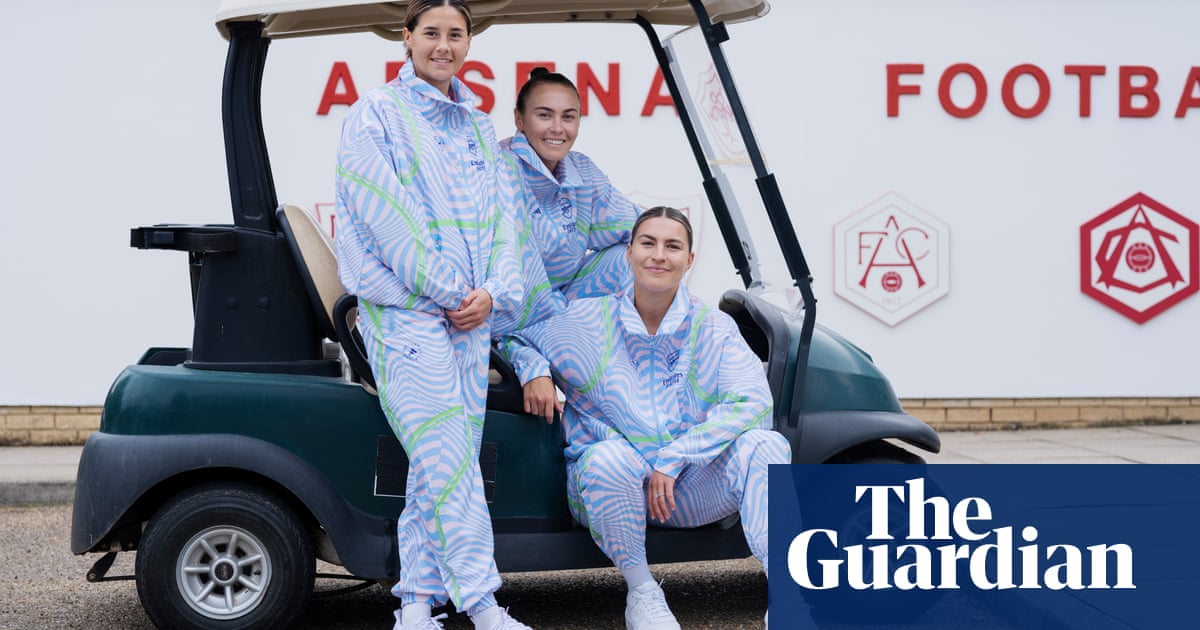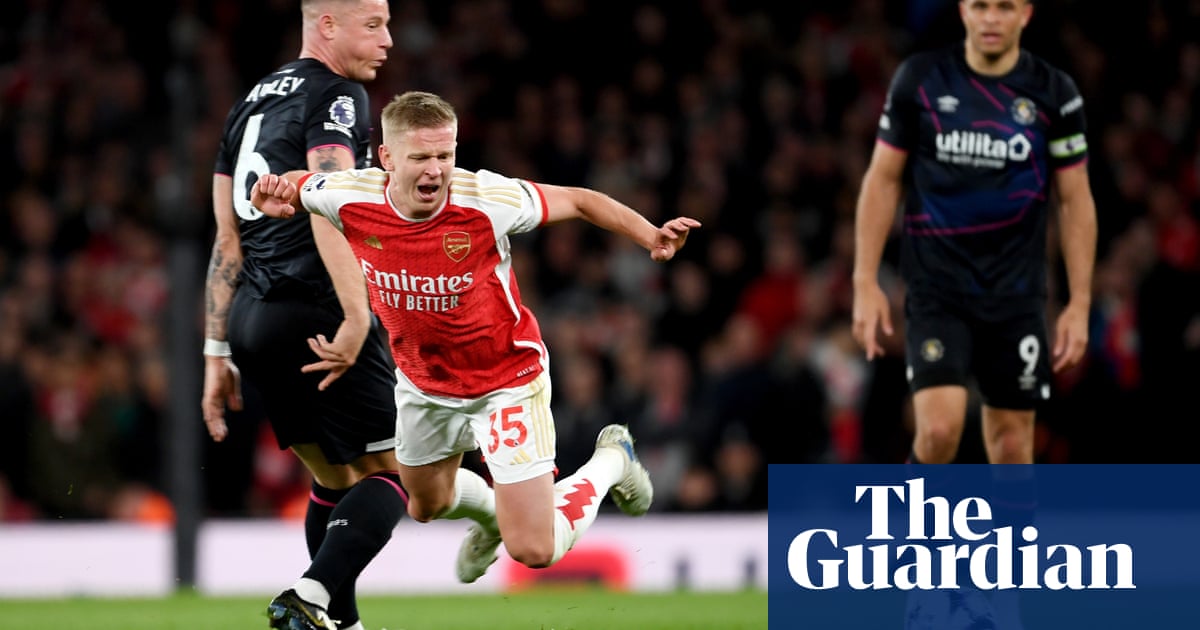
“When you see people giving everything they’ve got, you can’t help but be like: ‘I want to watch more, I want to support you, I want to back you,’” says the Arsenal full-back Steph Catley. “That’s what [fans] see in our team. Especially towards the end of last year, knowing how much we’d been through, losing so many of our teammates to injury, seeing we were absolutely giving everything – you can’t help but love a team that does that.”
Arsenal are back on Sunday, playing Liverpool at the Emirates Stadium in their opening WSL game with a crowd of more than 50,000 expected, ready to continue carrying a new fanbase with them on the next phase of their journey.
Since last season, the Australian contingent has grown to three with the exciting midfielder Kyra Cooney-Cross, who had to choose between pursuing tennis and football as a child, joining Catley and Caitlin Foord in north London, signing on the last day of the transfer window after a home World Cup.
The turnaround for all three, and many other World Cup players, has been short. For Foord and Catley there was one week off before they were thrown back into competitive football, with Champions League qualification at stake. Arsenal beat the Swedish side Linköping but lost on penalties to Paris FC, meaning they failed to progress to the group stage of the competition they reached the semi-finals of last season.
“We all came back from different places,” Foord says. “We were disappointed after the World Cup … Then to switch the mindset of disappointment, or whatever it is, and go into a competitive game, a Champions League game, it was hard. If I’m honest, it was hard to register it was a Champions League game and we’d been knocked out. I’m not making any excuses or anything, but we’re playing a Champions League game on artificial turf, it was just weird.”
Catley says: “It’s hard for people on the outside to fathom the pure exhaustion that you have after a major tournament. Unless you go through it, and you go towards the end of the tournament, which the majority of our squad did. It’s physical, it’s emotional, it’s mental, and then to try and think about all of that and sit with all of that and come back into an environment where immediately you’ve got something on the line that means so much and switch that mindset, it’s extremely hard.
“Not only that, we’ve got new players coming into the squad that we’ve never played with before, we’re playing against teams that have probably been preparing for months and had proper pre-seasons, it’s an extremely difficult situation. You can look at it from an outside and say we absolutely should have won, and we feel like that too – we want to be in the Champions League, they’re teams that we definitely think we can beat – but the situation is really difficult.”
Something needs to change to stop international success punishing players, says Catley, but how it changes is a big question. “I don’t know the solution,” she says. “I’m sitting here saying: ‘Yeah, let’s change it,’ but I wouldn’t know where to start.”
When Arsenal were beaten by Paris, thoughts about last season’s battle to finish third and have a chance of Champions League football were there. “I know that was in my mind, remembering a lot of last season and how hard we fought to get there,” says Catley. “But once it was over, it was hard to grasp that we’re actually not going to be in the Champions League, because it felt so far away removed from the Champions League, I suppose.”
The silver lining is a less packed schedule. The last time Arsenal failed to qualify for the Champions League, they won the league. “Immediately the mindset switches to that because there’s nothing you can do about the Champions League now, and this is something we can absolutely focus on and very much strive towards winning domestic trophies,” Catley says.
The World Cup in Australia and New Zealand was, in so many ways, a massive high. “Everyone I know was watching, literally everyone; people not even into football or anything, they were on board and watching us,” Foord says. “Walking in the street the thing for me, which was crazy, was people coming up and saying, ‘Thank you’, not, ‘Well done’. They changed the news and everything for our game, which is not heard of.”
Catley says: “It was all ‘thank you’. I got on a Qantas flight and one of the flight attendants had tears in her eyes, she was getting so emotional, just thinking about her journey and her daughter and stuff like that.
“Australia has always been a sporting country, we love our sport and we get around our national teams so much and they definitely have with the Matildas, but I think everything that’s ingrained in everyone in Australia towards sport and towards our country really just came to the forefront and it was like an explosion. It was amazing.”
Kyra Cooney-Cross chips in: “Even when we would walk out on the street, everyone would ask for a photo and three months ago that probably wouldn’t have happened.”
The result, though, fourth-place after a semi-final exit against England and a third-place playoff defeat by Sweden hurt. “We came fourth at the Olympics and then to do it again at a World Cup, you’re so close and an opportunity to do so on home soil as well, for me anyway it was more disappointment. Everyone was obviously then saying: ‘But what you did was bigger than that,’ this and that, and I guess I was trying to tell myself that, but ultimately we wanted to have a medal around our neck.”
It was Cooney-Cross’s first World Cup, and she hit the headlines for telling the media the talismanic captain Sam Kerr had torn a calf, when the extent of the injury was under wraps.
“I’ve been scared to do interviews ever since,” says the quiet midfielder. “It’s so weird. I said to Caitlin and Steph this morning: ‘I didn’t even know what Sam did to her calf.’ So, it’s weird that I said that. I knew she’d hurt her calf but I didn’t know what had happened to it.”
“We weren’t even telling the whole squad,” Catley says. “Not many people knew specifics.”
Catley stepped in as captain, a proud moment that left her feeling conflicted. “She [Kerr] came in and spoke to me at about 11pm the night before the game and basically just told me the diagnosis and we sat and chatted. I really had not much time to kind of wrap my head around it. It was dealing with emotions, and I was devastated for her; I’ve never felt that devastated for a teammate in my entire life.”
Foord loved the atmosphere in Australia, but there’s something different about walking out at the Emirates. “The crowds are just different here, football is just different here, and you can feel that,” she says.
Catley says: “When you first start playing in a big stadium that’s not your home, you might almost lose the home ground advantage, but now a majority of us have played there so much it feels like home, it feels like a fortress.”
Cooney-Cross is looking forward to experiencing it. “I’ve heard it’s a beautiful stadium and that Arsenal have amazing fans, so I’m really looking forward to it, and I love playing with pressure,” she says with a little smile.












